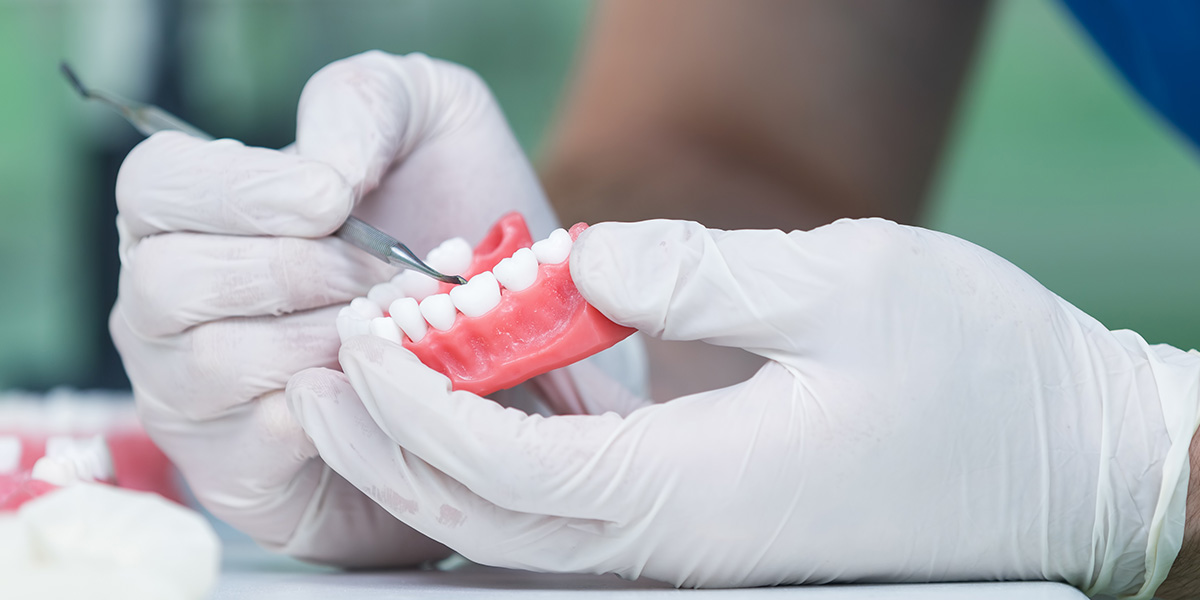Having sensitive teeth can be painful and frustrating. All you want to do is enjoy your favorite foods and drinks, only to find that it’s impossible to consume anything that’s too hot or cold because you experience severe pain. Tooth sensitivity can be caused by a variety of different conditions, some of which require immediate treatment and others that may not be as dire in nature. No matter what is causing your tooth sensitivity, there are treatment options available so that you can get back to living normally.
Tooth sensitivity can either be temporary or constant. Temporary tooth sensitivity is likely caused by worn enamel. When you eat or drink something that is either too hot or cold, it penetrates the dentin of the tooth, causing a reaction to the pulp, or nerve. If the sensitivity is constant, it may be a sign that there is something more problematic. A sensitivity that is specific to just one tooth could signal tooth decay and the need for either a filling or root canal. A sensitivity that is specific to just a few of your teeth could be a sign of gum recession, which exposes the vulnerable roots of the tooth.
The causes of tooth sensitivity vary greatly, with some causes being more problematic than others. For example, a tooth that is sensitive because of severe tooth decay requires immediate treatment whereas a tooth that is sensitive because of worn enamel may be able to be treated using desensitizing agents and toothpaste. Some of the different causes of tooth sensitivity include:
Worn Enamel – Acidic foods and drinks as well as using harsh whitening products can eventually begin to wear down the protective layer of enamel from the teeth. This may cause the teeth to begin to look transparent when a light is shone behind them, but it also causes issues with sensitivity.
Gum Recession – As your gums recede, the soft tissue pulls back and exposes the vulnerable roots of one or more teeth. This can cause sensitivity as hot and cold liquids as well as harsh brushing to affect the exposed roots.
Cracks and Fractures – If a tooth has cracked or fractured, it exposes the inner pulp where the nerves are located. This allows cold and hot liquids to pour into the tooth, affecting the pulp (nerve) and causing severe pain and sensitivity.
Tooth Decay – Tooth decay causes the enamel and dentin to be infected and affected by bacteria. This bacterial decay continues to eat away at the tooth, causing issues with sensitivity and pain. As the decay gets worse, it is able to reach the pulp (or nerve) of the tooth, causing the need for a complete root canal.
Worn Fillings – Even if you have a filling in one or more of your teeth, this doesn’t mean that they are necessarily there for life. In fact, most fillings only last for a few years before they may crack, shrink or completely fall out. It’s not uncommon for someone to not even realize that one or more of their fillings has fallen out. As the filling shrinks and cracks, this causes the tooth underneath to become vulnerable to hot and cold liquids, causing issues with sensitivity.
Tooth Grinding – If you grind your teeth, you’re wearing down the surface of the tooth and causing the inner dentin to become exposed. Constant grinding can even cause the teeth to fracture and crack due to force. This can cause issues with sensitivity and cause pain throughout the day. Most people who grind their teeth do it at night while they’re sleeping when they’re not even aware of it.

There are many different options when it comes to treating tooth sensitivity. With an examination, a series of x-rays and a consultation, it can be determined what’s causing your tooth sensitivity and the best way to begin treating it. Common treatment options for sensitivity include:
If you’ve ever seen a product claim it’s for tooth sensitivity, this is due to it having a desensitizing agent that blocks the pain that you’re experiencing. These products may come in a gel application form, mouthwash and most commonly, toothpaste. With several applications of the product, you will notice a significant reduction in tooth sensitivity and pain.
A mouth guard can be worn at night while you’re sleeping to prevent bruxism, known as tooth grinding. This prevents wear and tear to your teeth and can diminish as well as prevent severe tooth sensitivity.
If a tooth has broken or fractured, a dental crown can be placed over the area to protect the remaining tooth and prevent sensitivity. If the tooth has become severely cracked below the gum line or if you’d rather avoid more invasive dental options, an extraction can be done to completely remove the tooth.
If the tooth that’s experiencing sensitivity has a cavity, this can be filled with a composite resin material. If the decay has been allowed to reach the pulp (nerve) of the tooth, a complete root canal is needed to remove the infected pulp.
If gum recession is the cause of your tooth sensitivity, this can be remedied with a soft tissue graft. Most often, a small piece of tissue is removed from the palate of your mouth and used to cover the exposed roots. There are other grafting options available, such as the pinhole surgical technique for gum recession.
Most often, tooth sensitivity is caused by worn enamel. This can be prevented by avoiding drinking too many acidic, carbonated drinks and drinking through a straw to prevent direct contact with your teeth. Brushing using a soft-bristle toothbrush is essential for preventing too much wear to the enamel and can also help in preventing gum recession, which can be caused by aggressive, hard brushing techniques.
For men and women living in Syosset, NY, it is essential that you keep up with your dental appointments twice a year as well as seeking treatment if you begin to notice problems with sensitivity. In most cases, sensitivity is caused by worn enamel due to the foods and drinks you’re consuming as well as over-whitening your teeth. However, fractures, decay, deep cracks, and gum recession can also cause sensitivity and require immediate treatment.
Dentures are a type of dental prosthetic that is worn to enhance your smile and replace missing teeth. Your natural teeth may have fallen out due to periodontal disease or trauma, or you might have lost some or all of your teeth because of severe decay. In some cases, existing decayed or loose teeth will need to be completely removed prior to having a denture plate made. With technicians on site, having dentures made can be easy, quick and provide you with a lasting, beautiful smile. Dental technology has come a long way, so dentures look more realistic than ever.
There are two types of appliances: full or partial dentures. Partial dentures are only used when there are several teeth missing rather than an entire arch of teeth missing. Partial dentures are worn similarly to an orthodontic retainer, but they are designed to look natural and replace only the areas that are missing teeth. Full dentures are ideal for patients who are fully missing one or both arches of their natural teeth. The denture can be worn alone or with some type of adhesive, like a gel or strip. Some patients want a more secure-fitting appliance and opt for implant-supported dentures. Implant-supported dentures require implant surgery first, which will then be used to snap the specially-made appliance into place. Both partial and full dentures can last for anywhere from five years to seven years with proper maintenance and daily care. If your denture cracks, breaks or has a tooth fall out, the plate can be repaired rather than replaced if it is still relatively new.
You’ll need or even want dentures if you’re missing many or all of your natural teeth. Unfortunately, when you’re missing teeth, you may feel uncomfortable about the way that your smile looks. You may avoid smiling altogether or you may be hesitant to meet or see people, especially those you haven’t seen in a while. Missing teeth can also make you look older than you are, especially if you are missing a lot of your natural teeth. Dentures are comfortable to wear and can be customized for a perfect daily fit.

Dentures are typically made out of acrylic resin to provide a natural, comfortable fit. Most appliances have a base of metal, which helps to support the overall structure of the denture. The teeth of the denture are typically made out of durable resin plastic, which provides an incredibly strong biting surface when eating or chewing. The denture is made in a dental laboratory by highly trained and skilled dental lab technicians. These dental techs work rigorously to create each denture so that it matches the patients’ existing smile.
To create a denture, your dentist will take an impression of your mouth. The impression is sent to one of these local dental laboratories to be worked on by a technician. Prior to the impression being sent out, a tooth color match is taken and put with the impression. This ensures that your new denture plate matches your existing smile and doesn’t look out-of-place. Due to the high-quality materials used to make a denture, it can last for up to seven years.
Once the denture is made, you’ll come back into the office to have the bite and fit fully adjusted. The dentist files down and smooths out any ridges or areas that are hitting your gums and mouth. It is not uncommon to have to come in several times to have a perfect-fitting denture. Dentures may need to be adjusted or fully replaced later on if you either gain or lose weight. Dentures should always be comfortable and not painful to wear, but it can take months to get used to wearing a full set of dentures if you’ve never worn the appliance before.
To prolong the life of your denture, you need to take good care of it. This involves removing the denture from your mouth nightly to brush and soak it in a specially-formulated denture solution. The denture solution clears away any bacteria and plaque, making the denture safer and more hygienic to wear. Cleaning your denture is also important in preventing the likelihood of having bad breath during the day. Even if you are wearing a full set of dentures, you should still schedule regular dental appointments to have the appliance checked, repaired or adjusted as well as to check the health of your gums. It is not uncommon for denture wearers to eventually suffer bone loss in the jaw area, which can have an impact on the way that the appliance sits. If eventually, you decide you want your denture secured by implants, you can schedule a consultation to be considered for surgery.
Dentures are durable prosthetic appliances that can totally transform your smile. If you’re missing a lot of teeth or have had all of your natural teeth fall out or removed, the appliance works to fill in the mouth and create a more youthful appearance. If you are interested in having a new set of dentures made for you and are living in Syosset, Long Island, consider calling us here at Shine Dental so that we can further assist in scheduling an appointment for you. At Shine Dental, we offer an on-site lab, same day service and high-quality dentures that fit comfortably and look completely natural.